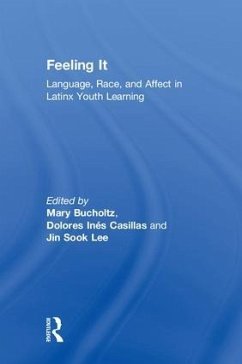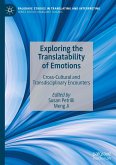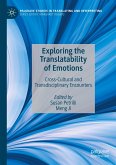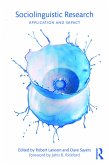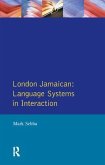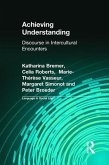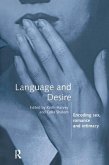Feeling It
Language, Race, and Affect in Latinx Youth Learning
Herausgeber: Bucholtz, Mary; Lee, Jin Sook; Casillas, Dolores Inés
Feeling It
Language, Race, and Affect in Latinx Youth Learning
Herausgeber: Bucholtz, Mary; Lee, Jin Sook; Casillas, Dolores Inés
- Gebundenes Buch
- Merkliste
- Auf die Merkliste
- Bewerten Bewerten
- Teilen
- Produkt teilen
- Produkterinnerung
- Produkterinnerung
Twelve leading and emergent researchers in Chicanx studies, education, feminist studies, linguistics and translation studies cohesively explore Latinx youth affect, language, and learning, drawing on data from an innovative university-community partnership that combines academic preparation for low-income youth of color with a social justice focus.
Andere Kunden interessierten sich auch für
![Exploring the Translatability of Emotions Exploring the Translatability of Emotions]() Exploring the Translatability of Emotions112,99 €
Exploring the Translatability of Emotions112,99 €![Emotion, Affect, Sentiment: Emotion, Affect, Sentiment:]() Emotion, Affect, Sentiment:49,00 €
Emotion, Affect, Sentiment:49,00 €![Exploring the Translatability of Emotions Exploring the Translatability of Emotions]() Exploring the Translatability of Emotions112,99 €
Exploring the Translatability of Emotions112,99 €![Sociolinguistic Research Sociolinguistic Research]() Sociolinguistic Research218,99 €
Sociolinguistic Research218,99 €![London Jamaican London Jamaican]() Mark SebbaLondon Jamaican179,99 €
Mark SebbaLondon Jamaican179,99 €![Achieving Understanding Achieving Understanding]() Peter BroederAchieving Understanding125,99 €
Peter BroederAchieving Understanding125,99 €![Language and Desire Language and Desire]() Language and Desire180,99 €
Language and Desire180,99 €-
-
-
Twelve leading and emergent researchers in Chicanx studies, education, feminist studies, linguistics and translation studies cohesively explore Latinx youth affect, language, and learning, drawing on data from an innovative university-community partnership that combines academic preparation for low-income youth of color with a social justice focus.
Hinweis: Dieser Artikel kann nur an eine deutsche Lieferadresse ausgeliefert werden.
Hinweis: Dieser Artikel kann nur an eine deutsche Lieferadresse ausgeliefert werden.
Produktdetails
- Produktdetails
- Verlag: Taylor & Francis
- Seitenzahl: 278
- Erscheinungstermin: 14. Februar 2018
- Englisch
- Abmessung: 229mm x 152mm x 18mm
- Gewicht: 567g
- ISBN-13: 9781138296794
- ISBN-10: 1138296791
- Artikelnr.: 51278664
- Herstellerkennzeichnung
- Libri GmbH
- Europaallee 1
- 36244 Bad Hersfeld
- gpsr@libri.de
- Verlag: Taylor & Francis
- Seitenzahl: 278
- Erscheinungstermin: 14. Februar 2018
- Englisch
- Abmessung: 229mm x 152mm x 18mm
- Gewicht: 567g
- ISBN-13: 9781138296794
- ISBN-10: 1138296791
- Artikelnr.: 51278664
- Herstellerkennzeichnung
- Libri GmbH
- Europaallee 1
- 36244 Bad Hersfeld
- gpsr@libri.de
Mary Bucholtz is Professor in the Department of Linguistics at the University of California, Santa Barbara (UCSB). She was the founding director and is currently an associate director of SKILLS (School Kids Investigating Language in Life and Society), UCSB's academic outreach, research, and social justice program. Dolores Inés Casillas is Associate Professor in Chicana and Chicano Studies at the University of California, Santa Barbara. She is also an associate director of SKILLS. Jin Sook Lee is Professor of Education in the Gevirtz Graduate School of Education at the University of California, Santa Barbara. She is the current director of SKILLS.
Chapter 1. You Feel Me?: Language and Youth Affective Agency in a
Racializing World. Mary Bucholtz, Dolores Inés Casillas, and Jin Sook Lee.
Part 1: Teaching, Learning, and the Affective Challenges of Social Justice.
Chapter 2. "Just" Emotions: The Politics of Racialized and Gendered Affect
in a Graduate Sociolinguistic Justice Classroom, Rachel Rys. Chapter 3.
Joint Creation: The Art of Accompaniment in the Language Beliefs of
Transformative Teachers, Elizabeth Mainz. Chapter 4. Sounding White and
Boring: Race, Identity, and Youth Freedom in an After-School Program, Anna
Bax and Juan Sebastian Ferrada. Part 2: Ideologies of Race and Language in
the Lives of Youth. Chapter 5. "There's No Such Thing as Bad Language,
but...": Colorblindness and Teachers' Ideologies of Linguistic
Appropriateness, Jessica Love-Nichols. Chapter 6. "I Feel Like Really
Racist for Laughing": White Laughter and White Public Space in a
Multiracial Classroom, Meghan Corella. Chapter 7. "You Don't Look Like You
Speak English": Raciolinguistic Profiling and Latinx Youth Agency, Adanari
Zarate. Chapter 8. The Complexities in Seguir Avanzando: Incongruences
between the Linguistic Ideologies of Students and Their Familias, Zuleyma
Nayeli Carruba-Rogel. Part 3: Youth as Affective Agents. Chapter 9.
Keeping Grandpa's Stories and Grandma's Recipes Alive: Exploring Family
Language Policy in an Academic Preparation Program, Tijana Hirsch. Chapter
10. "Without Me, That Wouldn't Be Possible": Affect in Latinx Youth
Discussions of Language Brokering, Audrey Lopez. Chapter 11. "To Find the
Right Words": Bilingual Students' Reflections on Translation and
Translatability, Katie Lateef-Jan. Chapter 12. Co-Constructing Academic
Concepts in Hybrid Learning Spaces: Latinx Students' Navigation of
"Communities of Practice", María José Aragón. Chapter 13. After Affects,
Mary Bucholtz, Dolores Inés Casillas, and Jin Sook Lee.
Racializing World. Mary Bucholtz, Dolores Inés Casillas, and Jin Sook Lee.
Part 1: Teaching, Learning, and the Affective Challenges of Social Justice.
Chapter 2. "Just" Emotions: The Politics of Racialized and Gendered Affect
in a Graduate Sociolinguistic Justice Classroom, Rachel Rys. Chapter 3.
Joint Creation: The Art of Accompaniment in the Language Beliefs of
Transformative Teachers, Elizabeth Mainz. Chapter 4. Sounding White and
Boring: Race, Identity, and Youth Freedom in an After-School Program, Anna
Bax and Juan Sebastian Ferrada. Part 2: Ideologies of Race and Language in
the Lives of Youth. Chapter 5. "There's No Such Thing as Bad Language,
but...": Colorblindness and Teachers' Ideologies of Linguistic
Appropriateness, Jessica Love-Nichols. Chapter 6. "I Feel Like Really
Racist for Laughing": White Laughter and White Public Space in a
Multiracial Classroom, Meghan Corella. Chapter 7. "You Don't Look Like You
Speak English": Raciolinguistic Profiling and Latinx Youth Agency, Adanari
Zarate. Chapter 8. The Complexities in Seguir Avanzando: Incongruences
between the Linguistic Ideologies of Students and Their Familias, Zuleyma
Nayeli Carruba-Rogel. Part 3: Youth as Affective Agents. Chapter 9.
Keeping Grandpa's Stories and Grandma's Recipes Alive: Exploring Family
Language Policy in an Academic Preparation Program, Tijana Hirsch. Chapter
10. "Without Me, That Wouldn't Be Possible": Affect in Latinx Youth
Discussions of Language Brokering, Audrey Lopez. Chapter 11. "To Find the
Right Words": Bilingual Students' Reflections on Translation and
Translatability, Katie Lateef-Jan. Chapter 12. Co-Constructing Academic
Concepts in Hybrid Learning Spaces: Latinx Students' Navigation of
"Communities of Practice", María José Aragón. Chapter 13. After Affects,
Mary Bucholtz, Dolores Inés Casillas, and Jin Sook Lee.
Chapter 1. You Feel Me?: Language and Youth Affective Agency in a
Racializing World. Mary Bucholtz, Dolores Inés Casillas, and Jin Sook Lee.
Part 1: Teaching, Learning, and the Affective Challenges of Social Justice.
Chapter 2. "Just" Emotions: The Politics of Racialized and Gendered Affect
in a Graduate Sociolinguistic Justice Classroom, Rachel Rys. Chapter 3.
Joint Creation: The Art of Accompaniment in the Language Beliefs of
Transformative Teachers, Elizabeth Mainz. Chapter 4. Sounding White and
Boring: Race, Identity, and Youth Freedom in an After-School Program, Anna
Bax and Juan Sebastian Ferrada. Part 2: Ideologies of Race and Language in
the Lives of Youth. Chapter 5. "There's No Such Thing as Bad Language,
but...": Colorblindness and Teachers' Ideologies of Linguistic
Appropriateness, Jessica Love-Nichols. Chapter 6. "I Feel Like Really
Racist for Laughing": White Laughter and White Public Space in a
Multiracial Classroom, Meghan Corella. Chapter 7. "You Don't Look Like You
Speak English": Raciolinguistic Profiling and Latinx Youth Agency, Adanari
Zarate. Chapter 8. The Complexities in Seguir Avanzando: Incongruences
between the Linguistic Ideologies of Students and Their Familias, Zuleyma
Nayeli Carruba-Rogel. Part 3: Youth as Affective Agents. Chapter 9.
Keeping Grandpa's Stories and Grandma's Recipes Alive: Exploring Family
Language Policy in an Academic Preparation Program, Tijana Hirsch. Chapter
10. "Without Me, That Wouldn't Be Possible": Affect in Latinx Youth
Discussions of Language Brokering, Audrey Lopez. Chapter 11. "To Find the
Right Words": Bilingual Students' Reflections on Translation and
Translatability, Katie Lateef-Jan. Chapter 12. Co-Constructing Academic
Concepts in Hybrid Learning Spaces: Latinx Students' Navigation of
"Communities of Practice", María José Aragón. Chapter 13. After Affects,
Mary Bucholtz, Dolores Inés Casillas, and Jin Sook Lee.
Racializing World. Mary Bucholtz, Dolores Inés Casillas, and Jin Sook Lee.
Part 1: Teaching, Learning, and the Affective Challenges of Social Justice.
Chapter 2. "Just" Emotions: The Politics of Racialized and Gendered Affect
in a Graduate Sociolinguistic Justice Classroom, Rachel Rys. Chapter 3.
Joint Creation: The Art of Accompaniment in the Language Beliefs of
Transformative Teachers, Elizabeth Mainz. Chapter 4. Sounding White and
Boring: Race, Identity, and Youth Freedom in an After-School Program, Anna
Bax and Juan Sebastian Ferrada. Part 2: Ideologies of Race and Language in
the Lives of Youth. Chapter 5. "There's No Such Thing as Bad Language,
but...": Colorblindness and Teachers' Ideologies of Linguistic
Appropriateness, Jessica Love-Nichols. Chapter 6. "I Feel Like Really
Racist for Laughing": White Laughter and White Public Space in a
Multiracial Classroom, Meghan Corella. Chapter 7. "You Don't Look Like You
Speak English": Raciolinguistic Profiling and Latinx Youth Agency, Adanari
Zarate. Chapter 8. The Complexities in Seguir Avanzando: Incongruences
between the Linguistic Ideologies of Students and Their Familias, Zuleyma
Nayeli Carruba-Rogel. Part 3: Youth as Affective Agents. Chapter 9.
Keeping Grandpa's Stories and Grandma's Recipes Alive: Exploring Family
Language Policy in an Academic Preparation Program, Tijana Hirsch. Chapter
10. "Without Me, That Wouldn't Be Possible": Affect in Latinx Youth
Discussions of Language Brokering, Audrey Lopez. Chapter 11. "To Find the
Right Words": Bilingual Students' Reflections on Translation and
Translatability, Katie Lateef-Jan. Chapter 12. Co-Constructing Academic
Concepts in Hybrid Learning Spaces: Latinx Students' Navigation of
"Communities of Practice", María José Aragón. Chapter 13. After Affects,
Mary Bucholtz, Dolores Inés Casillas, and Jin Sook Lee.

